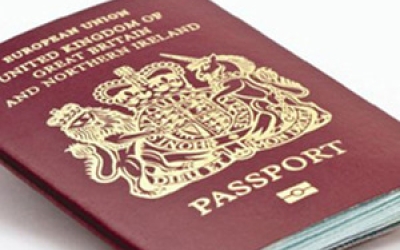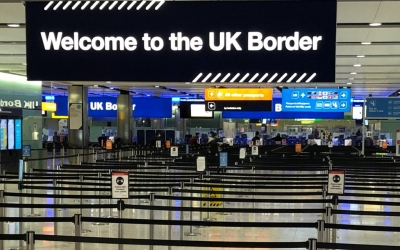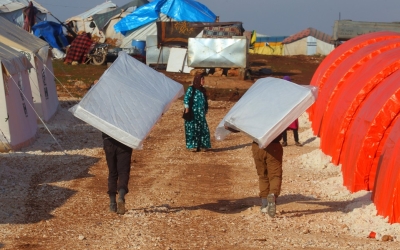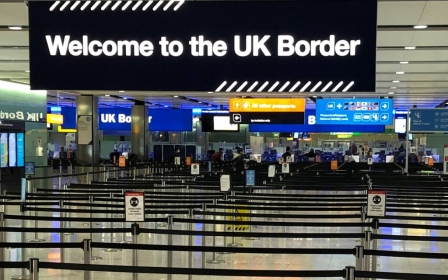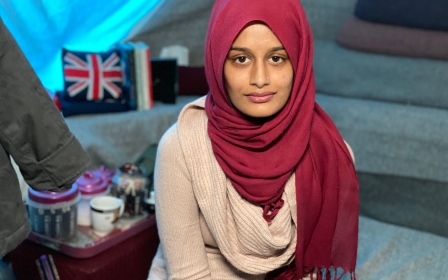British man unlawfully left stateless over travel to Syria returns to UK
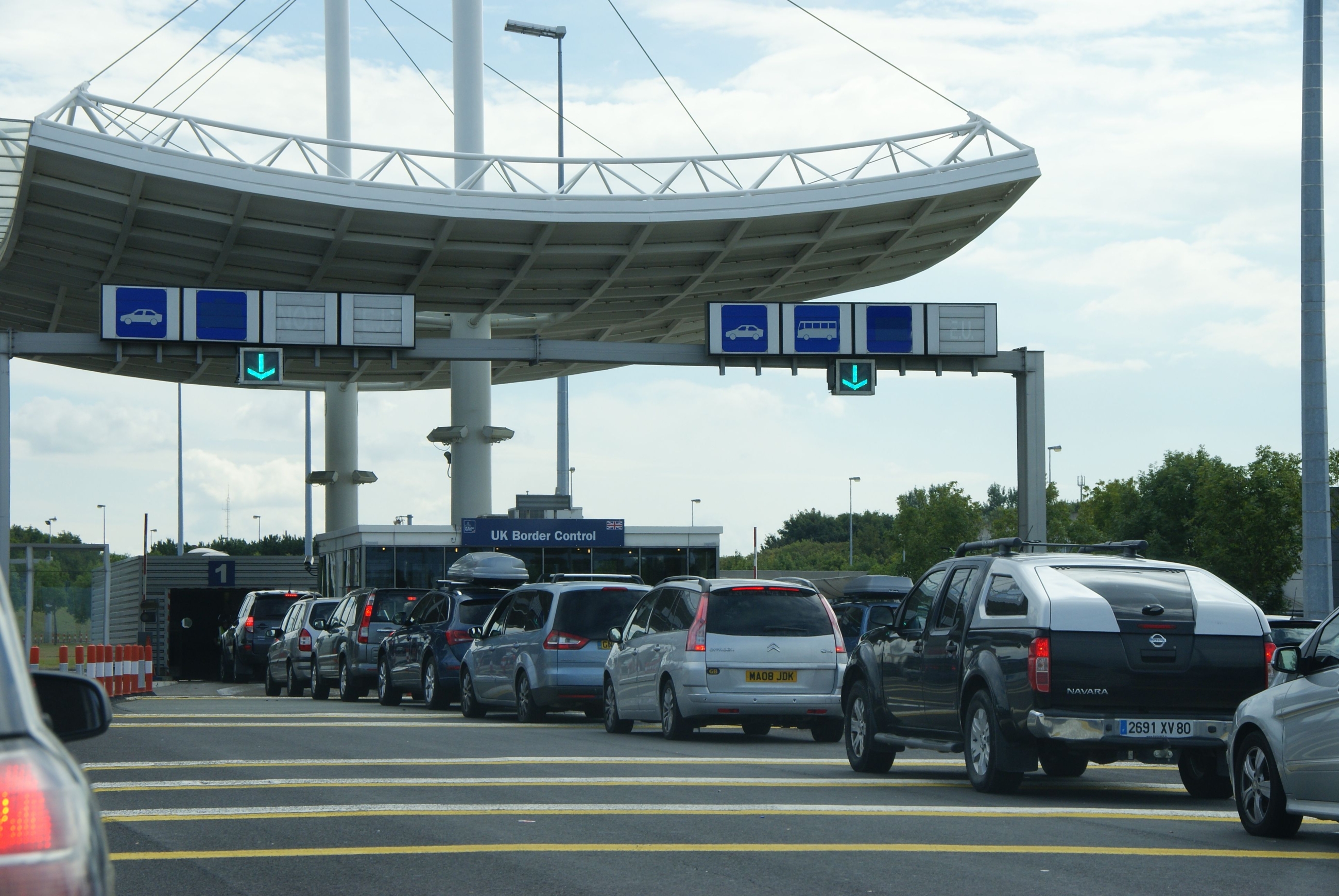
A British man stranded abroad for years because his citizenship was revoked over his travel to Syria has returned to the UK, after the Home Office conceded it had left him stateless unlawfully.
The man, known as N3 throughout court proceedings in which he was granted anonymity, was arrested by police at a British border point in northern France on Wednesday and taken to London for questioning, his lawyer, Fahad Ansari, told Middle East Eye.
Ansari said the man was still in custody on Friday but had not been charged, and was looking forward to clearing his name of any allegations of wrongdoing.
“After four years of litigation we have finally got to the point where he has been asked a question by a law enforcement officer,” said Ansari.
“He has waited a long time to come home. He is looking forward to getting back to see his wife and kids. He is missing his mum.”
New MEE newsletter: Jerusalem Dispatch
Sign up to get the latest insights and analysis on Israel-Palestine, alongside Turkey Unpacked and other MEE newsletters
Legal battle
N3 was deprived of his citizenship in 2017 on the grounds that he was assessed by the government to be a threat to national security because of his travels to Syria, and because it deemed he was a Bangladeshi national.
At that time he was based in Turkey. He says he was involved in Syria-related aid work and had travelled to and from the UK regularly prior to losing his citizenship.
N3's return to the UK follows a protracted legal battle with the British government which has brought scrutiny on its use of controversial citizenship-stripping powers against dozens of British nationals who travelled to Syria.
The UK and citizenship-stripping powers
+ Show - HideThe UK has been described by researchers as a “global leader in using citizenship deprivation as a counterterrorism measure”.
Historic citizenship-stripping powers targeted at naturalised citizens on disloyalty grounds had largely fallen into disuse prior to 2002, when the government introduced new measures in an attempt to revoke the citizenship of Abu Hamza, an Egyptian-born cleric subsequently convicted of terrorism in the US.
The 2002 legislation allowed for British-born nationals as well as naturalised citizens to lose their nationality rights. Successive governments gradually broadened the scope of the powers so that home secretaries can now deprive anyone of citizenship if they are satisfied that doing so is “conducive to the public good” and would not leave an individual stateless.
No criminal conviction is required. Letters often state that individuals have been assessed as presenting “a risk to the national security of the United Kingdom”.
The government’s use of the powers surged to unprecedented levels in response to the perceived threat posed by British nationals returning from Syria.
Between 2010 and 2015, 33 people were stripped of their citizenship, according to Home Office figures. In 2016, 14 people were deprived, and in 2017 the number jumped to 104.
In 2018, the figure was 21, and in in 2019 - when Shamima Begum was among those targeted - it was 27. It then dropped to ten in 2020 and eight in 2021.
Some subjects of citizenship-stripping orders argue that they have been left effectively stateless, because the government bases its assessment that they are dual nationals on a right of citizenship to a parent’s country of birth, even if they have never taken up that citizenship or even visited the country.
In some cases the Special Immigration Appeals Commission, which rules on citizenship cases, has agreed: it has ruled in favour of British nationals of Bangladeshi descent on the grounds that Bangladesh does not consider them citizens if they have not claimed Bangladeshi nationality before the age of 21.
Human rights organisations and lawyers have compared the powers to “medieval exile and banishment”. Critics also point out that the powers create a two-tier system in which only those deemed to be dual nationals are at risk of losing their British citizenship; a measure that discriminates against naturalised citizens, immigrants and their children.
N3's citizenship was restored in 2018 by the Special Immigration Appeals Committee (SIAC), which rejected the government's argument that he was entitled to Bangladeshi citizenship and had not therefore been left stateless.
N3 was born in Bangladesh but was entitled to British citizenship by birth, and he grew up in the UK. SIAC ruled that his right to claim Bangladeshi citizenship had expired at the age of 21.
The government appealed against the ruling in the Court of Appeal. In November 2019 it ordered SIAC to look again at the case because of an “error in law”, depriving N3 of his citizenship once again.
N3 applied to appeal against that judgment at the Supreme Court. Then, last month, SIAC ruled in favour of three other British nationals of Bangladeshi heritage who it said had been wrongly assessed to be Bangladeshi nationals in a case which corrected the legal issues raised in N3's case by the Court of Appeal.
Pressed by N3's lawyers to drop the case against him, Home Secretary Priti Patel wrote to him in France on 20 April to notify him that the government conceded that he had been wrongly deprived of citizenship.
Temporary exclusion order
The next day, Patel issued a temporary exclusion order against him, a counter-terrorism measure requiring the subject to request permission to enter the UK and to allow his or her return to be managed. It also imposes restrictions such as requirements to report to a police station or to notify authorities of changes of address.
He was subsequently taken by French immigration authorities to Coquelles, where the UK operates border controls at the entrance to the Channel tunnel, and handed into British police custody.
Middle East Eye exclusively reported on the UK government’s use of citizenship-stripping powers against British nationals in Syria in 2017.
Those targeted include people suspected of travelling to join Islamic State, some of whom are now being held in camps in northeastern Syria, and people involved in aid work in opposition-held Idlib province in the northwest.
'No man's land'
N3 told MEE in March 2020 that uncertainty surrounding his case left him in “no man’s land”, with French authorities seeking to deport him but unable to find a country willing to take him. “Either I am British or I am stateless,” he said. “The French are in limbo and they don't know what to do.”
Ansari said: "My client has been systematically targeted by the state for over three years, using almost every measure at its disposal to penalise him without having to prove the case against him in an open court of law. This sustained campaign of harassment has deprived his children of their father for too long now and must come to an end.”
N3’s return was also welcomed by Cage, an advocacy group which highlights the impact of counter-terrorism powers on Muslim communities.
Muhammad Rabbani, Cage’s managing director, said: “We welcome this result with guarded optimism for the hundreds of other British nationals that have all been deprived of their basic right to citizenship using 'secret evidence'. This case highlights the extent to which such executive powers are abused."
The Metropolitan Police said in a statement that a 37-year-old man had been arrested at Coquelles on Wednesday on suspicion of terrorism offences. It said a warrant of further detention was granted by Westminster Magistrates’ Court on Thursday, allowing police to keep the man in custody until Tuesday.
A Home Office spokesperson said: “We do not routinely comment on individual cases.”
Middle East Eye delivers independent and unrivalled coverage and analysis of the Middle East, North Africa and beyond. To learn more about republishing this content and the associated fees, please fill out this form. More about MEE can be found here.


